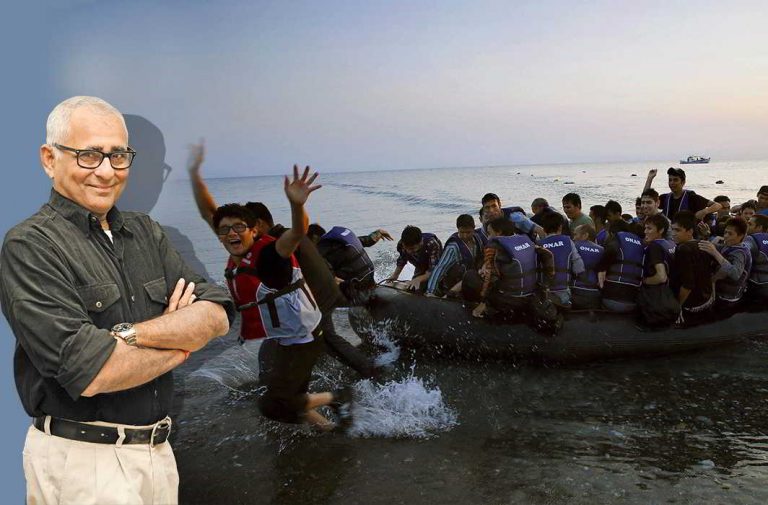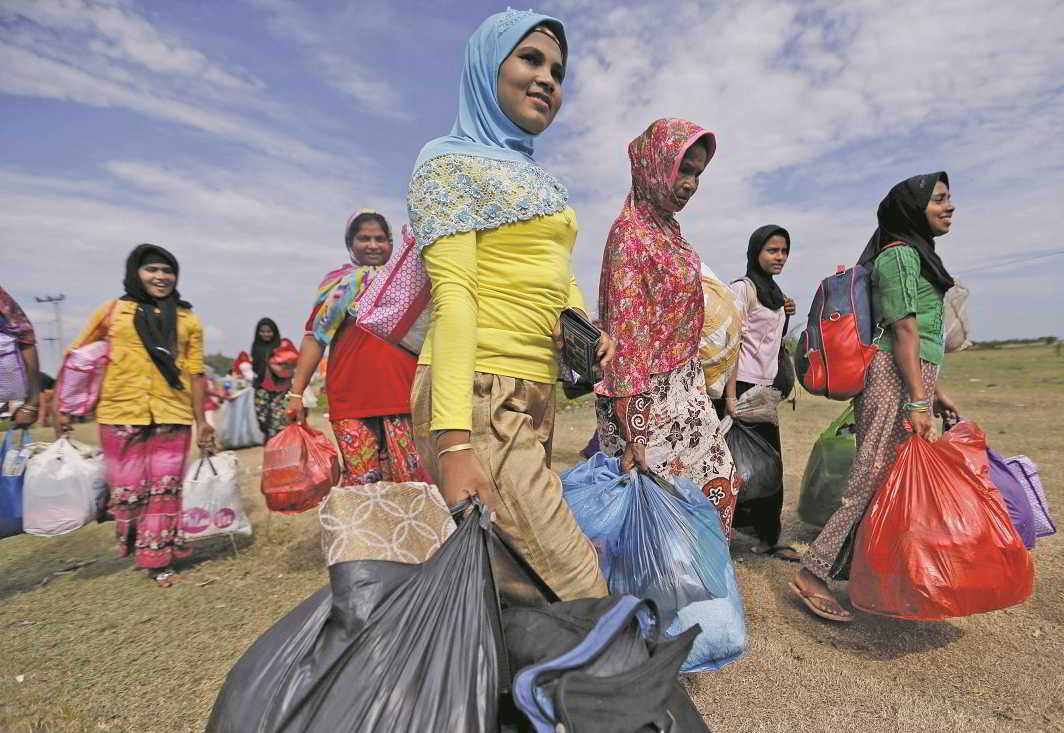
~By Inderjit Badhwar
It is ironical that in today’s world, which has been shaped by waves upon waves of human migrations over the millennia, “immigration” and “migrants” have become dirty words in the minds of millions of people across the globe. Thanks to the refugee crises stemming from conflicts in the Arab world and parts of Africa, outsiders pouring into different countries are considered a dangerous, polluting sub-human species unworthy of The Rights of Man which civilised democracies have held to be universal and valid at all times.
In characterising immigrants as a scourge, Trumpism in America and the alt-right in Europe have made the world forget that the act of migrating across borders as well as the interests of migrants—whether documented aliens or not—is actually governed by domestic statutes and international conventions under the rule of law.
This is only a natural corollary to the march of human civilisation which has been shaped culturally, linguistically, socially and ethnically by migrants who made their way to distant lands due to climate changes, pestilence, war, conquest, epidemics, persecution, forced deportations, ethnic cleansing, economic hardship, political partitions, and the compulsions of technology.
In ruling against President Trump’s immigration ban, the US system of justice simply reasserted the principle that in a democracy guided by the rule of law, the Rights of Man cannot be arbitrarily abolished by executive fiat. Due process, in this case drawing its strength from international agreements as well as state laws and individual liberties, cannot be sacrificed at the altar of some conjured up emergency.

Above all, the laws and conventions on refugees and immigrants are also based on humanitarian principles founded on historical experience. For example, had the Jews not kept perpetually migrating starting with their expulsion by the Babylonians and Assyrians, and then the Romans and czars and Nazis, they would probably be extinct today. So would the Gypsies.
Actually, immigration is the true face of globalisation. Hence, world covenants such as UNESCO’s International Convention on the Protection of the Rights of All Migrant Workers and Members of Their Families which came into force in July 2003. Its primary objective is to protect migrant workers and their families, a particularly vulnerable population, from exploitation and the violation of their human rights.
The Convention does not propose new human rights for migrant workers. Part III of the Convention “is a reiteration of the basic rights which are enshrined in the Universal Declaration of Human Rights and elaborated in the international human rights treaties adopted by most nations”.
So why are those rights subject to another International Legal Instrument?
“The Convention seeks to draw the attention of the international community to the dehumanization of migrant workers and members of their families, many of whom being deprived of their basic human rights. Indeed, legislation implementing other basic treaties in some States utilizes terminology covering citizens and/or residents, de jura excluding many migrants, especially those in irregular situations.”
Excerpts:
-
Basic freedoms
Applying these fundamental rights to migrant workers and members of their families, the Convention provides for their right to leave and enter the State of origin (Art. I). The inhumane living and working conditions and physical (and sexual) abuse that many migrant workers must endure are covered by the reaffirmation of their “right to life” (Art. 9) and prohibition against cruel, inhuman or degrading treatment of punishment (Art. 10) as well as slavery or servitude and forced or compulsory labour (Art. 11). Migrant workers are also entitled to basic freedoms like the freedom of thought, conscience and religion (Art. 12), and the right to hold and express opinions (Art. 13). Their property should not be confiscated arbitrarily (Art. 15).
-
Due process
The Convention then goes on to explain in detail the need to ensure due process for migrant workers and members of their families (Art. 16 – 20). Investigations, arrests and detentions are to be carried out in accordance with established procedures. Their right to equality with nationals of the State before the courts and tribunals must be respected. They must be provided with necessary legal assistance, interpreters and information in a language understood by them. When imposing a sentence, humanitarian considerations regarding the person’s migrant status should be taken into account. The arbitrary expulsion of migrant workers is prohibited (Art. 22).
Most importantly, migrant workers are to be treated “as equal to the nationals of the host country in respect of remuneration and conditions of work [overtime, hours of work, weekly rest, holidays with pay, safety, health, termination of work contract, minimum age, restrictions on home work, etc. (Art. 25)]. Equality with nationals extends also to social security benefits (Art. 27) and emergency medical care (Art. 28).
While enumerating this bundle of rights, the Convention recognises that “the human problems involved in migration are even more serious in the case of irregular migration” and the need to encourage appropriate action “to prevent and eliminate clandestine movements and trafficking in migrant workers, while at the same time assuring the protection of their fundamental rights” (Preamble).

As measures for preventing and eliminating illegal labour migration, the Convention proposes that the States concerned should collaborate in taking appropriate actions against the dissemination of misleading information relating to emigration and immigration, to detect and eradicate illegal or clandestine movements of migrant workers and impose sanctions on those who are responsible for organising and operating such movements as well as employers of illegal migrant workers (Art. 68). However, the fundamental rights of undocumented migrant workers are protected by the Convention (Art. 8 – 35).
In this context it is worth studying India’s Law Commission’s 175th report (2000). It was in response to former Home Minister LK Advani’s concerns of millions of immigrants streaming into India across its eastern borders. It was, and still remains, a far more serious situation—a harbinger of communal violence, overcrowding, criminal activities and local job losses—than the entry of immigrants from Syria and Somalia into the US or Europe.
The Law Commission’s lengthy recommendations were calibrated and grounded solidly in international commitments as well as India’s own Constitutional principles. It is a lengthy report, a far cry from Trump’s ban-‘em-‘n-lock-‘em-up-n’throw-‘em-out approach.
The Commission chose the option of recommending incorporation of new provisions in the existing Foreigners Act as to make it effective enough to meet the main problem of illegal immigration, without interfering with the existing legal frame-work.
“The Commission is of the view that the problem of illegal migration from neighboring countries has to be tackled seriously by providing a machinery for effective and speedy detection of illegal entrants. The function of determining whether a person is an illegal entrant or not is proposed to be entrusted to the Immigration Officers whose orders shall be appealable, to be heard and decided by an Immigration Tribunal, manned by a person who has been a District Judge or an Additional District Judge.
“The matters shall be decided by them according to the principles of natural justice. Besides, facilitation centers are also proposed to be provided for detaining the foreigners pending the determination of their status, and pending their deportation. So far as the offences under the Act are concerned, they are proposed to be tried by the Immigration Court which would be a court of District & Sessions Judge to be specified by the appropriate government in each district.”
The problem of legal and illegal immigration into India, especially West Bengal, and Assam, continues unabated. It is a politically volatile issue. But in tackling it, given the human dimensions of the problem, the government has chosen the wiser course of toughness, tempered by legal due process.

